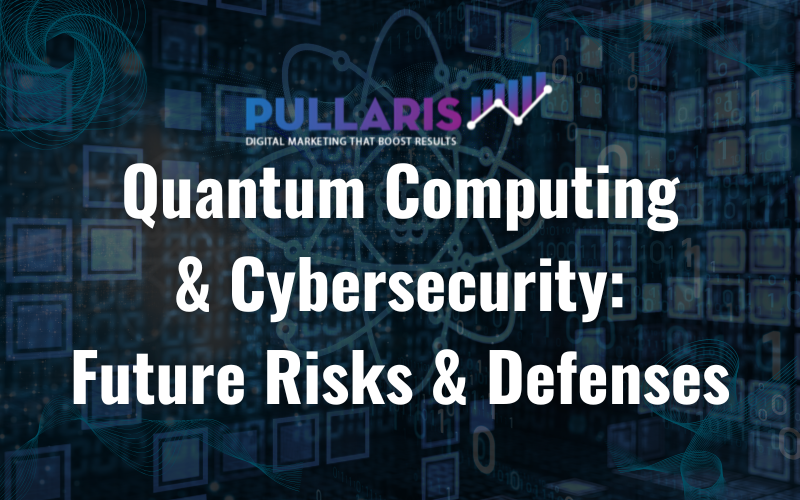Quantum Computing and Cybersecurity: Future Risks & Defenses
Quantum Computing and Cybersecurity: Future Risks & Defenses

Quantum Computing and Cybersecurity: Future Risks & Defenses
The rise of quantum computing is set to revolutionize industries—from drug discovery to financial modeling—by solving problems that classical computers can’t. But with great power comes great risk, especially for cybersecurity.
Quantum computers could break modern encryption, expose sensitive data, and disrupt digital trust. Yet, they also offer new ways to defend against cyber threats.
In this post, we’ll explore:
✔ How quantum computing threatens today’s encryption
✔ Which cybersecurity systems are most at risk
✔ Post-quantum cryptography: The race to future-proof security
✔ How organizations can prepare
✔ Why learning quantum-safe cybersecurity now is crucial (and how Panitech can help!)
1. The Quantum Threat: Breaking Today’s Encryption
Most online security relies on public-key cryptography, such as RSA and ECC (Elliptic Curve Cryptography). These methods secure everything from banking transactions to government communications.
However, quantum computers running Shor’s algorithm could factor large numbers exponentially faster than classical machines, making RSA and ECC obsolete.
🔹 When will this happen?
- Current quantum computers (like IBM’s 433-qubit Osprey) are still error-prone and lack the stability (fault tolerance) needed.
- Experts estimate 5–15 years before quantum machines can crack RSA-2048.
But hackers are already harvesting encrypted data today, hoping to decrypt it later—a strategy called “Store Now, Decrypt Later” (SNDL).
Why This Matters Now
Even if large-scale quantum decryption is years away, the threat is already real. Governments, financial institutions, and enterprises storing long-term sensitive data (e.g., medical records, classified intelligence) must act before quantum computers become powerful enough.
2. Cybersecurity Systems at Risk
Quantum decryption could compromise these systems if it becomes viable.
✅ SSL/TLS encryption (protecting websites)
✅ Digital signatures (used in blockchain, contracts, and software updates)
✅ VPNs and secure messaging (Signal, WhatsApp)
✅ Military and government communications
Even symmetric encryption (AES-256) could be weakened by Grover’s algorithm, though doubling key sizes may help.
Industries Most Vulnerable
- Finance: Banking transactions, stock markets, and digital wallets.
- Healthcare: Encrypted patient records and research data.
- Government & Defense: Classified communications and national security systems.
- IoT & Critical Infrastructure: Smart grids, autonomous vehicles, and industrial control systems.
3. Post-Quantum Cryptography: The Defense Strategy
What’s the good news? Researchers are developing quantum-resistant algorithms. The U.S. National Institute of Standards and Technology (NIST) has selected four encryption standards for post-quantum security:
🔸 CRYSTALS-Kyber (Key encapsulation)
🔸 CRYSTALS-Dilithium (Digital signatures)
🔸 FALCON (Lightweight signatures)
🔸 SPHINCS+ (Hash-based signatures)
These rely on lattice-based, hash-based, and multivariate cryptography, which are believed to resist quantum attacks.
The Timeline for Adoption
- 2024–2026: NIST finalizes PQC standards.
- 2026–2030: Large-scale migration begins (banks, governments, tech giants).
- 2030+: Quantum-safe encryption becomes the norm.
But waiting until 2030 is too late. Early adopters will have a competitive advantage in security and compliance.
4. How Organizations Can Prepare
While large-scale quantum hacking isn’t imminent, proactive steps are crucial:
✔ Audit encryption systems—Identify reliance on RSA, ECC, or other vulnerable methods.
✔ Plan migration to post-quantum cryptography (PQC)—test NIST-approved algorithms.
✔ Adopt hybrid encryption—combine classical and quantum-resistant algorithms.
✔ Monitor quantum advancements—stay ahead of potential threats.
The Role of Cybersecurity Professionals
The shift to quantum-safe security requires skilled professionals who understand
- Quantum computing fundamentals
- Post-quantum cryptographic algorithms
- Migration strategies for legacy systems
This stage is where upskilling becomes essential.
5. Why You Should Start Learning Now (and How Panitech Can Help!)
The quantum revolution isn’t just coming—it’s already here. Cybersecurity professionals who prepare now will lead the next wave of digital defense.
🚀 Enroll in Panitech’s Quantum & Cybersecurity Program
At Panitech, we offer cutting-edge courses designed to equip you with
🔹 Understanding of quantum computing threats
🔹 Hands-on training in post-quantum cryptography
🔹 Real-world strategies for securing enterprises
Why Choose Panitech?
✅ Industry-expert instructors with real-world experience
✅ Practical labs and simulations
✅ Certification recognized by top employers
Don’t wait for the quantum threat to strike—be the solution!
📢 Limited seats available! Enroll now and future-proof your career:
👉 https://panitechacademy.com/

